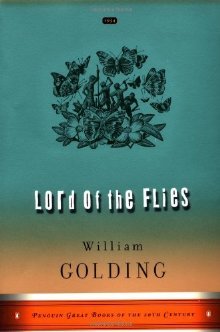| I haven't written a book review for quite a while, but now that I have some time (actually I'm pushing away some essays to write this review) I will do just that. Funny thing is, my class will be reading Lord of the Flies starting this week, but me being a bad girl and all, I went ahead and read it myself. I'd heard many negative things about this book from many of my fellow friends. I can't blame them. They read the book with their classes, and why would anybody in their right sense enjoy a book...more   I haven't written a book review for quite a while, but now that I have some time (actually I'm pushing away some essays to write this review) I will do just that. I haven't written a book review for quite a while, but now that I have some time (actually I'm pushing away some essays to write this review) I will do just that.Funny thing is, my class will be reading Lord of the Flies starting this week, but me being a bad girl and all, I went ahead and read it myself. I'd heard many negative things about this book from many of my fellow friends. I can't blame them. They read the book with their classes, and why would anybody in their right sense enjoy a book they were forced to read? Despite the negative remarks, I quite enjoyed this book. In fact, I found it to be an exhilarating ride filled with allegorical depth and eye tearing moments. Many elder critics have stated that this book is nothing but a didactic novel coated with allegory, and that once the reader passes the figurative aspect of the book, nothing but a bare skeleton is left. A bare skeleton lacking substance in characterization and actual theme building. I would say otherwise. The characters, though they may all represent something greater then themselves, are all very realistic. Their behavior, for young adolescents, invites the sympathy of the readers. They are stranded on an island after all, with no adults to look after and take care of them. This sympathy is further built upon when the young adolescents began to rebel against each other, and some of these children are made to bear the brunt of the weight more than others-these children being Ralph and Piggy; two key characters who also happened to be my favorites. Ralph is the first character we are introduced to, and so we build a general bond with him. This bond grows as he becomes the leader of a group of boys and struggles to hold them together. Piggy is the second boy we encounter, and whereas Ralph is the mighty bronze, Piggy is the intellectual behind him. The one true friend who sticks by him through the good and the bad. The friend who acts as, more or less, the brain. Golding has created three dimensional characters out of these two. Ralph, for example, may be the leader, but he too is vulnerable to the evil, as Golding suggests, that shadows man. This vulnerability renders Ralph an interesting character. His shameful behavior, calling Piggy names, teasing some of the other boys, entices emotion out of the reader. We are made to feel disgusted, and in a sense, betrayed by our beloved character. To say the least, Ralph is a faulty little boy, but as the journey progresses and innocence is lost, he makes us proud through his courageous actions. That brings us to the theme of the book. Yes, many people say that the theme relates to the undeniable evil within man, which, when given the right circumstance, brings out the savage in us. I'm going to be a bit more general and state the theme to be that no human being is perfect, and evil is within every shadow and corner. Ralph is, as I see it, the representative of imperfection. He is the chosen leader on the island, but he too must succumb to a lower level. And as with Piggy, though he may be a modern intellectual, his physical aspect degrades him before the other boys. Golding, in regards to Ralph and Piggy, chooses to exhibit imperfection by using different means; Physical (Piggy), and spiritual (Ralph). As with evil always present in some form or way, Golding has used many different characters to portray this message. There would be Jack, one of the opposing boys, along with Roger. Jack is a haughty boy who likes to be in the light. He craves power, leadership, and when he does not get these things, he resorts to evil. Not evil right away, but as the readers, we see a gradual inclination towards evil on his part. He starts off by breaking up into a separate group, and then he takes to theft, following that, murder. As for Roger, he does not crave power, but simply wishes to bring harm upon the vulnerable. At one point he wishes to harm a younger boy, but the ever loosening grip of civilization holds him back. Of course, in the end that grip loosens completely, and he too, resorts to evil. As I have explained above, evil is not necessarily innate in all men, as some suggest the theme to be, but it is ever present for those to trip and fall down in its abyss (Roger, Jack). There is a lesser degree of evil, as shown in Ralph, but I would suggest that to be nothing but childish folly. To conclude, this book was absolutely stunning. I was swept away by the adrenaline that coursed through the book. I was brought to tears when my favorite characters were brought to tears, and I was absolutely amazed at the depth of this 'didactic' novel. |